List of Chief Rabbis of Israel
The Chief Rabbi of Israel was a religious appointment that began at the time of the British Mandate in Palestine, and continued through to the State of Israel. The post has two nominees, one for the Ashkenazi communities that came from Europe, and one for the Sefaradi communities from North Africa and the Middle East. In recent times the post has become more political than religious.
List of Chief Rabbis
| No | Image | Name | Term | Notes |
|---|---|---|---|---|
| 1 | Abraham Isaac haCohen Kook | 1921-1935 | Mandatory Palestine | |
| 2 | Yitzchak haLevi Herzog | 1936-1959 | Chief Rabbi of Ireland 1919-1936
First Chief Rabbi of Israel Father of Israeli president, Chaim Grandfather of the leader of the Israeli Labor Party, Isaac | |
| 3 | 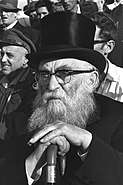 |
Isser Yehuda Unterman | 1964-1973 | |
| 4 |  |
Shlomo Goren | 1973-1983 | Chief Rabbi of the IDF 1948-1968 |
| 5 | 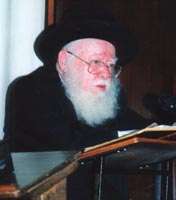 |
Avraham Shapira | 1983-1993 | |
| 6 | 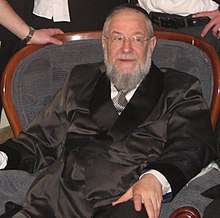 |
Yisrael Meir Lau | 1993-2003 | |
| 7 | Yona Metzger | 2003-2013 | Later convicted for fraud and served prison sentence | |
| 8 |  |
David Lau | 2013-present | Son of Yisrael Meir Lau |
| No | Image | Name | Term | Notes |
|---|---|---|---|---|
| 1 | Yaacov Meir | 1921-1939 | First Chief Rabbi of Palestine | |
| 2 | 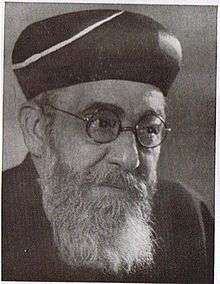 |
Ben-Zion Uziel | 1939-1954 | First Chief Rabbi of Israel |
| 3 | Yitzchak Nissim | 1955-1973 | ||
| 4 | Ovadia Yosef | 1973-1983 | Spiritual leader and founder of Shas political party | |
| 5 | 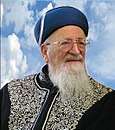 |
Mordechai Eliyahu | 1983-1993 | |
| 6 | 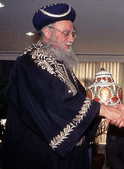 |
Eliyahu Bakshi-Doron | 1993-2003 | Convicted of fraud |
| 7 | Shlomo Amar | 2003-2013 | ||
| 8 | Yitzchak Yosef | 2013-present | Son of Ovadia Yosef |
Pre-Israel religious authority
The Chief Rabbi of Jerusalem
In addition to the Chief Rabbis there were a number of rabbis who served as the head rabbi in Palestine, or of a particular community
- Levi ibn Habib (b. Spain)—ruled from Jerusalem but in 1538, Rabbi Jacob Berab who came from Spain via Egypt, sought to revive the Sanhedrin, in Safed, thus making that city the competing capital of the Jewish community in Palestine. He was opposed and exiled by ibn Habib and the rabbis of Jerusalem but Safed remained the competing capital for a number of years thereafter. Berab was succeeded in Safed by Joseph Caro (b. Spain) who was ordained by him.
- David ben Solomon ibn Abi Zimra of the Egyptian rabbinate—ruled simultaneously in Jerusalem succeeding ibn Habib. In 1575, Moshe Trani (b. Greece) succeeded Caro in Safed.
- Moshe ben Mordechai Galante of Rome—ruled from Jerusalem
- Haim Vital—succeeded Trani in Safed but moved his rabbinate to Jerusalem which, once again, became the sole capital of Israel. In 1586, the Nahmanides Synagogue was confiscated by the Arabs and the ben Zakkai Synagogue was built in its stead.
- Bezalel Ashkenazi—first chief rabbi to preside in the ben Zakkai Synagogue[1]
- Gedaliah Cordovero[2]
- Yitzhak Gaon?
- Israel Benjamin[3]
- Jacob Zemah (b. Portugal)[4]
- Samuel Garmison (b. Greece)[5]
Rishon LeZion 1665–1842[6]
- Moshe ben Yonatan Galante
- Moshe ibn Habib who came from Greece, a descendant of Levi ibn Habib
- Moshe Hayun
- Avraham Yitzhaki (b. Greece)
- Benjamin Maali
- Elazar Nahum (b. Turkey)
- Nissim Mizrahi
- Yitzhak Rapaport
- Israel Algazy served until 1756
- Raphael Meyuchas ben Shmuel served 1756–1791
- Haim ben Asher
- Yom Tov Algazy—during whose reign, the French armies of Napoleon invaded Palestine. served until 1802
- Moshe Yosef Mordechai Meyuchas served 1802–1805
- Yaakov Aish of the Maghreb
- Yaakov Coral
- Yosef Hazzan (b. Turkey)
- Yom Tov Danon
- Shlomo Suzin—in 1831, Palestine was briefly conquered by Egypt under Muhammad Ali.
- Yonah Navon—Palestine returned to the Ottoman Empire.
- Yehuda Navon
The Hakham Bashi 1842–1918[7]
- Avraham Haim Gaggin (b. Turkey)
- Yitzhak Kovo
- Chaim Nissim Abulafia (b. 1795, Tiberias; d. 1860, Jerusalem)[8]
- Haim Hazzan (b. Turkey)
- Avraham Ashkenazi (b. Greece)
- Raphael Panigel (b. Bulgaria)
- Yaakov Shaul Elyashar
- Yaakov Meir
- Yoseph Zundel Salant
- Shmuel Salant
- Eliyahu Moshe Panigel
- Nahman Batito
- Nissim Danon—In 1917, Palestine was occupied by the British. Danon was succeeded as chief rabbi after World War I by Haim Moshe Eliashar who assumed the title of Acting Chief Rabbi.
Chief Rabbinate Council
The Chief Rabbis also head the Chief Rabbinate Council. These rabbis are usually appointed from the Chief Rabbis of major cities or regions in Israel. Internal elections were held on September 23, 2008.[9][10]
There are five permanent members on the Chief Rabbinate Council. These are:
- The Ashkenazi Chief Rabbi (David Lau)
- The Sephardi Chief Rabbi (Yitzhak Yosef)
- Chief Rabbi of Tel Aviv (Yisrael Meir Lau)
- Chief Rabbi of Haifa (Shlomo Chelouche)
- Chief Rabbi of Beersheba (Yehuda Deri)
There are also representatives for the Ashkenazi and Sephardi communities:
|
Ashkenazi representatives
|
Sephardi representatives
|
References
- ↑ Encyclopedia Judaica—"Levi ben Habib"—vol. 11 col. 99; "Berab, Jacob"—vol. 4 cols. 582–4; "Caro, Joseph"—vol. 5 col. 194; "Galante, Moses (I)"—vol. 7 col. 260; "Ashkenazi, Bezalel"—vol. 3 col. 723; jewishencyclopedia.com, "Jerusalem—Jacob Berab and ibn Habib"
- ↑ Encyclopedia Judaica—"Cordovero, Gedaliah—vol. 5 col. 967
- ↑ Encyclopedia Judaica—"Benjamin, Baruch"—vol. 4 col. 527; "Benjamin, Israel"—vol. 4 col. 528
- ↑ http://jewishencyclopedia.com, "Jerusalem—Solomon al-Gazi's Description"
- ↑ Encyclopedia Judaica—"Garmison, Samuel"—vol. 7 col. 329
- ↑ Encyclopedia Judaica—"Rishon Le-Zion" vol. 14 col. 193; jewishencyclopedia.com, "Jerusalem—In the Eighteenth Century" "In the Nineteenth Century" "Albert Cohn and Ludwig Frankl"
- ↑ Encyclopedia Judaica "Jews of Jerusalem" "Institutions"; Encyclopedia Judaica—"Israel, State of"—Religious Life and Communities—vol. 9 cols. 889–90
- ↑ Laredo, Abraham Isaac. Les noms des Juifs du Maroc, Consejo Superior de Investigaciones Científicas, Instituto "B. Arias Montano," 1978. pg. 184
- ↑ "Chief Rabbinate:Rabbi Elituv in First Place". 2008-09-23. Retrieved 2008-09-23.
- ↑ "Ashkenazi haredim lose majority in Chief Rabbinate membership vote". The Jerusalem Post. 2008-09-23. Retrieved 2008-09-23.